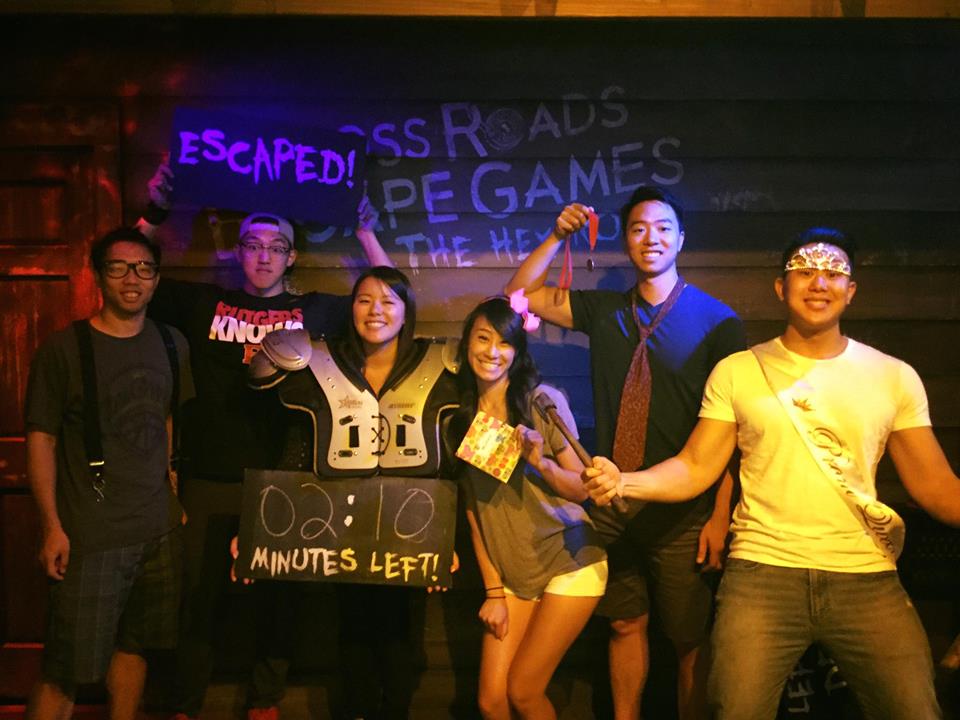Recently, I played through an escape room and was paired with a woman and her two daughters. It was their first escape room experience, whereas it was my group’s 18th. At first we had wanted to try and beat our other friend’s escape time, but after learning that it was our teammates first room, we changed our goal to making sure our teammates had an incredible first experience. We all worked as a team and managed to escape the room (almost beating our friends time as well). We were all super psyched and were hyped on the post-escape glow. That is when something strange happened.
After the game, I got a chance to talk to our game master and he thanked us for treating our teammates so well! Now… this came as a complete shock to me because I hadn’t really considered the idea that some people might treat their teammates badly. I mean we all want to escape, right? We all know that working as a team is always better than trying to solo a room, right? Shouldn’t all experienced players remember the excitement of their first room? I was caught so off guard that all I said was something like “k” and then smiled really wide. He laughed and explained himself a bit more to me.
Apparently, many people that are teamed up with strangers in a public escape room end up treating these teammates poorly. After I learned that, I started paying attention to how people were treating their teammates. To say the least, I was shocked. In response to what I’ve seen, I’ve decided to write this article about how to be a good teammate. After all, the more people that enjoy escape rooms, the more successful our favorite games will become. So here are my tips to being a good teammate in escape rooms.
#1 Communicate, Communicate, Communicate
Now I know that many of you enthusiasts are rolling your eyes right now, but let me remind you that not everyone understands how important it is to TALK TO YOUR TEAMMATES; not just your friends, but anyone that is currently trying to escape with you. Talk to ALL members of your team and keep in constant contact. I have played a few public escape rooms now, and it is hard to break a long silence. Some players might be too shy to break the silence as well. The first thing I do, even before I get into the escape room, is introduce myself and my group. Then I usually talk about how many games I have done (which gives them a chance to say how many they have), and suggest other games that I have done that were good. Basically, I build enough rapport with my new teammates to open a nice comfortable line of communication between everyone. This allows new players/strangers to feel familiar enough with me to share their ideas.
#2 Listen to everyone
Now you’ve made yourself approachable, GREAT, but it won’t matter in the slightest if you don’t actually listen to what your teammates are saying. You have no idea how many times I have been Game Mastering a game and someone has shouted out the right answer only to be completely ignored by their teammates. To avoid having this happen to your team, listen to your team. Anytime your teammates come up with an idea, engage them on it, talk to them about it, and if someone wants to try out a solution, then give it a shot. Not every answer will be right, but all ideas deserve to at least be heard… as long as the solution doesn’t involve breaking any rules.
#3 Ask for help
This one seems like one a piece of advice that shouldn’t be needed, but is. Remember that it’s okay to ask for help. No one wants to be the person stuck on the same puzzle for half an hour. If one of your teammates wants to help you, you should let them. Why not let them have a chance to solve the puzzle as well, who knows… they might even come up with an answer you haven’t thought of yet. Everyone thinks a little differently, and sometimes that difference is all that is needed to figure out a puzzle. And just because you weren’t the one to open the lock does not mean that you did not help solve the puzzle.
#4 Don’t snatch things out of people’s hands
On an equally important note, just because someone is struggling with a puzzle does not mean that you should snatch it out of their hands. This is very rude. A better way to approach this is to ask the player if they could use some help. Try asking what they’ve tried so far, and LISTEN as they explain it. This might spark an idea in your head that they haven’t tried yet.
#5 Brainstorm as a group
We have all heard the age old axiom that two heads are better than one, right? Well, in an escape room this because incredibly apparent. Everyone thinks a little differently and if you give ten people the exact same puzzle, they will come up with 11 different solutions. Not everyone comes up with the same solution, and not every solution needs to be right. Try the ones that seem simple and straightforward, and if it doesn’t work… no problem! You still have a plethora of possible solutions to try.
However, if someone does not discuss their ideas with the group, then they will get hung up on what they want the solution to be and will not be able to see past it. On my team, we have one person whose primary role is to jump to conclusions and make wild leaps of reason. Now this might seem counter intuitive to many of you, but a crazy idea is always better than no idea at all. Often times, by just attempting to solve the puzzle with a crazy idea you can find new information about the puzzle that helps you solve it faster. And even if an idea seems like a super crazy leap, it should still be heard and discussed because it might spark the right idea in someone else’s head.
#6 You are not the key master
What I mean by that is… don’t hold onto the keys and clues the entire game. Try to keep your hands free for exploring and opening things. Remember that it is always important to investigate EVERYTHING in your room. You never know where the next clue might be hiding. So it is important to keep your hands free when searching for clues. Pick a place and set your clue there. If you figure out where it might be useful, you can always go back for it… it probably won’t move on its own. This also has the added benefit of letting other people in your team have a chance to use the clue as well.
#7 Don’t put anything in your pockets
I will try and say this as straightforward as possible, which for me is a bit of a challenge… Do Not Hog The Keys! Do Not Put The Keys In Your Pockets! This is quite possibly one of the most infuriating things you can do to your teammates. No one wants to be the person that puts a key in his or her pockets and then forgets about it. It can quite literally cost you the game.
Now here is a better solution than putting things in your pocket. Before you begin investigating your room and finding clues, pick a spot where you and your teammates can put important clues and keys. This way, nothing gets lost and everyone has access to everything important.
This will save you so much time and prevent any “this-is-all-your-fault” moments caused by forgetting about the keys in your pocket.
#8 Let others have a chance to unlock locks
This is such a small thing, but it can make such a huge difference to new players. The best feeling you get from Escape Rooms is when you figure out the puzzle and open a lock. It is so gratifying and so satisfying. We all remember our first escape room. We all remember the rush we got from opening our first lock, or our first final door. So why not let the new player on your team be the ones to open the lock?
Remember that everyone was new once. We all sucked at one point or another. So don’t rob someone of a great first impression of escape rooms just because you think they aren’t carrying their weight or whatever. If you want the escape room industry to continue to flourish, then we need new players… and lots of them.
If you are greedy or rude during someone’s first room, they may not give escape rooms another chance; they most certainly won’t spread their excitement to their friends and families. If you ruin an experience for a new player, you run the risk of preventing them from ever introducing their friends as new players into the industry. No new players means no new games.
So next time you figure out the solution to a puzzle, share the love and let the new player open the lock.
#9 Participate! There is always something to do!
No one likes it when someone just stands around doing nothing. There are so many things to do in an escape room, and there is really no reason to do nothing. And no one wants to babysit someone who is just sitting there.
Even if you aren’t being a “downer” and are just sitting there, you are still affecting the team’s mentality. You doing nothing will still distract them. Someone might even join you and try and keep you company… great. Now two people aren’t helping. See the problem with this? You could be contributing a unique idea into a brainstorm, or you could be remembering clues and reporting them to your team, or you could even be giving your team moral support as you look through drawers, bookshelves, etc. You are here to have a good time, so try to participate and help your team mates!
#10 Have Fun
This is by far the most important rule of all. Remember that this is a game and is meant to be fun. You’d be surprised how many people need to be reminded of this fact. The room, its puzzles, you and your teammates, are all there for fun. This is an entertainment industry, so let yourself be entertained! Give yourself over to the experience and ESCAPE for a little while.
So these are the biggest hints I can give you about how to be a good teammate in an escape room, whether you are playing with strangers, or just your friends. Being good at escape rooms is more about being an effect and empathetic communicator than anything else. When working as a team, even the most inexperienced players can break long held records! Good luck thrill seekers, and have fun!
Jason Sakal
Manager & Game Master
Cross Roads Escape Games







It’s great to know these tips for being good at escape rooms. You have a good point, that listening to everyone’s opinion is a good idea. I’ll admit, I like to take charge, but that isn’t the best idea for a team building activity.
I have some friend who are planning on going on an activity, and have an escape room as a possible destination. I appreciate that you talked about the various tips on becoming a good teammate and how to communicate to your team in that situation. It really helped when you said to keep in constant contact, and to share any ideas. Hopefully this information will help my friends play effectively in their escape room attempt.
Hello I am so excited I found your weblog, I really found you by mistake, while I was looking on Bing for something else, Anyhow I am here now and would just like to say thank you for a incredible post and a all round exciting blog (I also love the theme/design), I don’t have time to read through it all at the minute but I have bookmarked it and also added in your RSS feeds, so when I have time I will be back to read a lot more, Please do keep up the excellent job.
Wow, it’s a great article! I’m going to play in the escape room this week, so this article is what I’ve been looking for, and my favourite part is about keeping constant contact with other teammates. Using these tips, I feel more prepared to start playing and have a fun.
I’ve been thinking about getting an escape room set up as a team building exercise, and I think that being able to get some tips would be good. I’m glad you talked about being able to let other people have an opportunity to unlock doors. I’m going to have to see if we can find a good team building opportunity and see how it works for us!